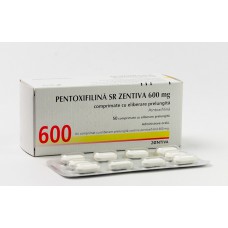Expiration date: 03/2026
Structure and Composition:
Tablets are enteric coated. One tablet contains pentoxifylline 600 mg
auxiliary substances: milk sugar (lactose), potato starch, water soluble methyl cellulose Povidone (PVP low molecular medical) stearic acid tsellatsefat (acetylphthalyl) titanium dioxide, paraffin oil castor oil beeswax talc
testimony
- Occlusive atherosclerotic peripheral arterial disease or diabetic origin (eg, intermittent claudication, diabetic angiopathy);
- Cerebrovascular disease (the effects of cerebral arteriosclerosis, such as violation of concentration, dizziness, memory impairment), ischemic and post stroke state;
- Trophic disorders of tissues as a result of violations of arterial or venous microcirculation (trophic ulcers, post-thrombotic syndrome, frostbite, gangrene);
- Circulatory disorders in the eye blood vessels (acute and chronic circulatory failure in the network or in the choroid);
- Dysfunction of middle ear vascular origin, accompanied by hearing loss.
dosage
The tablets are taken orally without chewing, regular, at one and the same time, preferably during or after meals, drinking plenty of water and without chewing.
Cerebrovascular disease: Pentoxifylline SR Zentiva prescribed 400 mg 2-3 times / day or 600 mg 1-2 times / day.
Occlusive peripheral arterial disease stage II (intermittent claudication): Pentoxifylline SR Zentiva appoint 400 mg 3 times / day or 600 mg 2 times / day. The daily dose is 1200 mg.
Trophic disorders of tissues as a result of violations of arterial or venous microcirculation: Pentoxifylline SR Zentiva prescribed 400 mg 2-3 times / day or 600 mg 1-2 times / day. The maximum daily dose is 1,200 mg.
Duration of treatment and dosage of the drug Pentoxifylline SR Zentiva regime established by the attending physician individually, depending on the clinical picture of the disease and the therapeutic effect.
In applying the drug Pentoxifylline SR Zentiva in patients with hepatic impairment, severe caution functions, depending on individual tolerability of the drug may require dose reduction.
In applying the drug Pentoxifylline SR Zentiva in patients with impaired renal function with CC less than 30 ml / minute, caution is necessary. It may require dose reduction by 50-70%.
Side effect
In applying the drug Pentoxifylline SR Zentiva may cause the following side effects, which are separated by system-organ classes according to MedDRA classification. Determining the frequency of side effects according to the WHO classification: very common (?10%); frequently (?1% and <10%); uncommon (?0.1% and <1%); rarely (?0.01% and <0.1%); very rare (<0.01%); Frequency not known (according to available data to determine the frequency of occurrence of side effects is not possible).
From the nervous system: the frequency is unknown - headache, dizziness, convulsions, aseptic meningitis.
On the part of the psyche: the frequency is unknown - agitation, sleep disturbances, anxiety.
Since the cardiovascular system: the frequency is unknown - tachycardia, arrhythmia, angina, lower blood pressure, "tides" of blood to the skin, bleeding (including bleeding from vessels in the skin, mucous membranes, gastrointestinal bleeding, epistaxis) .
Skin and subcutaneous tissue disorders: frequency not known - pruritus, erythema (skin redness), rash, swelling, increased fragility of nails.
From the digestive system: the frequency is unknown - anorexia, atony bowel, epigastric discomfort, bloating (feeling of fullness), nausea, vomiting, diarrhea, dry mouth, intrahepatic cholestasis, increased ALT and ACT, AP.
From a sight organ: the frequency is unknown - blurred vision, scotoma.
From hemopoiesis system: the frequency is unknown - thrombocytopenia, leukopenia, pancytopenia, gipofibrinogenemia.
On the part of the immune system: the frequency is unknown - anaphylactic / anaphylactoid reactions, angioedema, anaphylactic shock, bronchospasm.
Contraindications
- Acute myocardial infarction;
- Massive bleeding (risk of increased bleeding);
- Retinal hemorrhage (bleeding risk amplification);
- Acute hemorrhagic stroke;
- Pregnancy;
- The period of breast-feeding;
- The age of 18 years (effectiveness and safety have been established);
- Hypersensitivity to pentoxifylline, other methylxanthine derivatives or other components of the drug.
Precautions should use the drug in patients with marked decrease in blood pressure (risk of further reduction in blood pressure) and hemodynamically significant heart rhythm disturbances; Chronic heart failure (CHF); severe liver function impairment (risk of accumulation and an increased risk of side effects); impaired renal function with CC less than 30 ml / min (risk of accumulation and an increased risk of side effects); gastric ulcer and duodenal ulcer; with an increased tendency to bleeding, for example, by the use of anticoagulants [vitamin K antagonists] or the blood coagulation system disorders (more risk of major bleeding); after recent myocardial surgery (risk of bleeding); proliferative diabetic retinopathy; simultaneously with hypoglycemic drugs (insulin and hypoglycemic agents for oral administration) and ciprofloxacin.
Pregnancy and breast-feeding
Use of the drug Pentoxifylline SR Zentiva is contraindicated during pregnancy.
Use of the drug Pentoxifylline SR in Zentiva is contraindicated during breast-feeding, because the active substance is excreted in breast milk. If necessary, administration of the drug should refrain from breastfeeding.
Application for violations of liver function
Precautions: hepatic impairment.
Application for violations of renal function
In patients with chronic renal insufficiency (creatinine clearance less than 30 ml / min) - Table 1-2. 400 mg. Patients with severe renal impairment at admission agapurin CP need careful medical supervision.
Use in children
Contraindicated: the age of 18 years (effectiveness and safety have been established).
Use in elderly patients
dose reduction may be required in elderly people (increased bioavailability and reduced clearance rate).
special instructions
In patients with low and unstable blood pressure dose Pentoxifylline SR Zentiva should be selected individually.
Treatment should be under the control of blood pressure.
In patients with diabetes, taking hypoglycemic agents, the drug Pentoxifylline SR Zentiva in high doses can cause hypoglycemia (dose correction is required).
In appointing the drug Pentoxifylline SR Zentiva simultaneously with anticoagulants should be carefully monitored for indicators of blood coagulation.
In patients who have undergone recent surgery, requires systematic monitoring of hemoglobin concentration and hematocrit.
Elderly patients may require a dose reduction (increased bioavailability and reduced clearance rate).
With caution and under close medical supervision should be used drug Pentoxifylline SR Zentiva in patients with impaired liver function severe degrees of severity in patients with severe renal impairment (creatinine clearance below 30 ml / min).
If during treatment in patients having bleeding in the retina of the eye, the drug immediately overturned.
Smoking may reduce the therapeutic efficacy of the drug.
Use in Pediatrics
Use of the drug Pentoxifylline SR Zentiva in children and adolescents under the age of 18 years is contraindicated. Safety and effectiveness of Pentoxifylline SR Zentiva drug in this age group has not been established.
Overdose
Symptoms: dizziness, nausea, vomiting, like "coffee grounds", marked reduction of blood pressure, tachycardia, arrhythmia, redness of the skin, loss of consciousness, vomiting, areflexia, tonic-clonic seizures.
In the case of the above violations of the patient should seek immediate medical attention.
Treatment: symptomatic therapy. At the first signs of overdose (sweating, nausea, cyanosis), immediately stop taking the drug. If the drug has recently adopted, should ensure that the measures aimed at preventing further absorption of the drug through its elimination (gastric lavage) or depot (for example, administration of activated charcoal). Particular attention should be directed at maintaining blood pressure and respiratory function. When seizures are administered diazepam. A specific antidote is not known.
Drug interactions
Pentoxifylline SR Zentiva may enhance blood pressure reduction while the use of antihypertensive drugs (eg, ACE inhibitors), or other drugs with potential hypotensive effect (such as nitrates).
Pentoxifylline SR Zentiva may increase the effects of drugs that affect blood clotting (direct and indirect anticoagulants, thrombolytics, antibiotics such as cephalosporins). When combined pentoxifylline and indirect anticoagulants (vitamin K antagonists) in the post-marketing studies have been cases enhance the anticoagulant action (risk of bleeding). Therefore, at the beginning of receiving pentoxifylline or change the dose recommended to control the degree of anticoagulant effect in patients taking this combination of drugs (for example, to carry out regular monitoring of the INR).
Cimetidine can increase the concentration in plasma pentoxifylline (the risk of side reactions).
Co-administration with other xanthines can lead to excessive nervous excitement.
Hypoglycemic effect of insulin or hypoglycemic agents for oral administration may be increased by concomitant use of medication Pentoxifylline SR Zentiva (increased risk of hypoglycaemia). It is necessary to strictly monitor the status of patients, including regular blood glucose control.
In a joint application Pentoxifylline SR Zentiva may increase the effects of valproic acid.
Some patients, while using the drug Pentoxifylline SR Zentiva and theophylline there is an increase of theophylline plasma concentrations. Further it may lead to an increase in the incidence of adverse effects associated with theophylline.
Some patients, while using the drug Pentoxifylline SR Zentiva and ciprofloxacin marked increase in the concentration of plasma pentoxifylline. This further can increase or enhance the adverse reactions associated with the use of this combination.
*The appearance of the package may vary.
Pentoxifylline
600mg
20
tablets
long
- Brand: Zentiva


